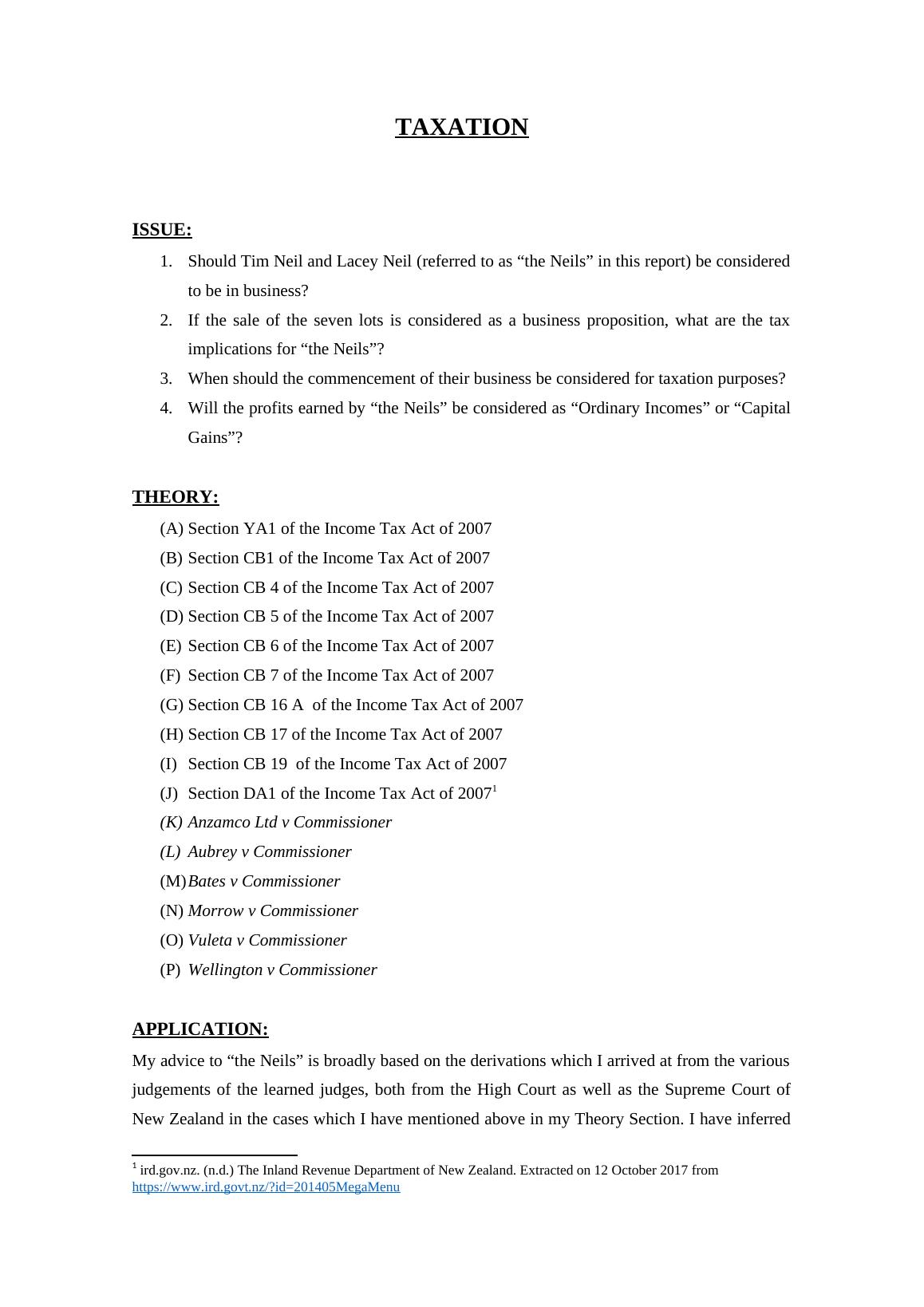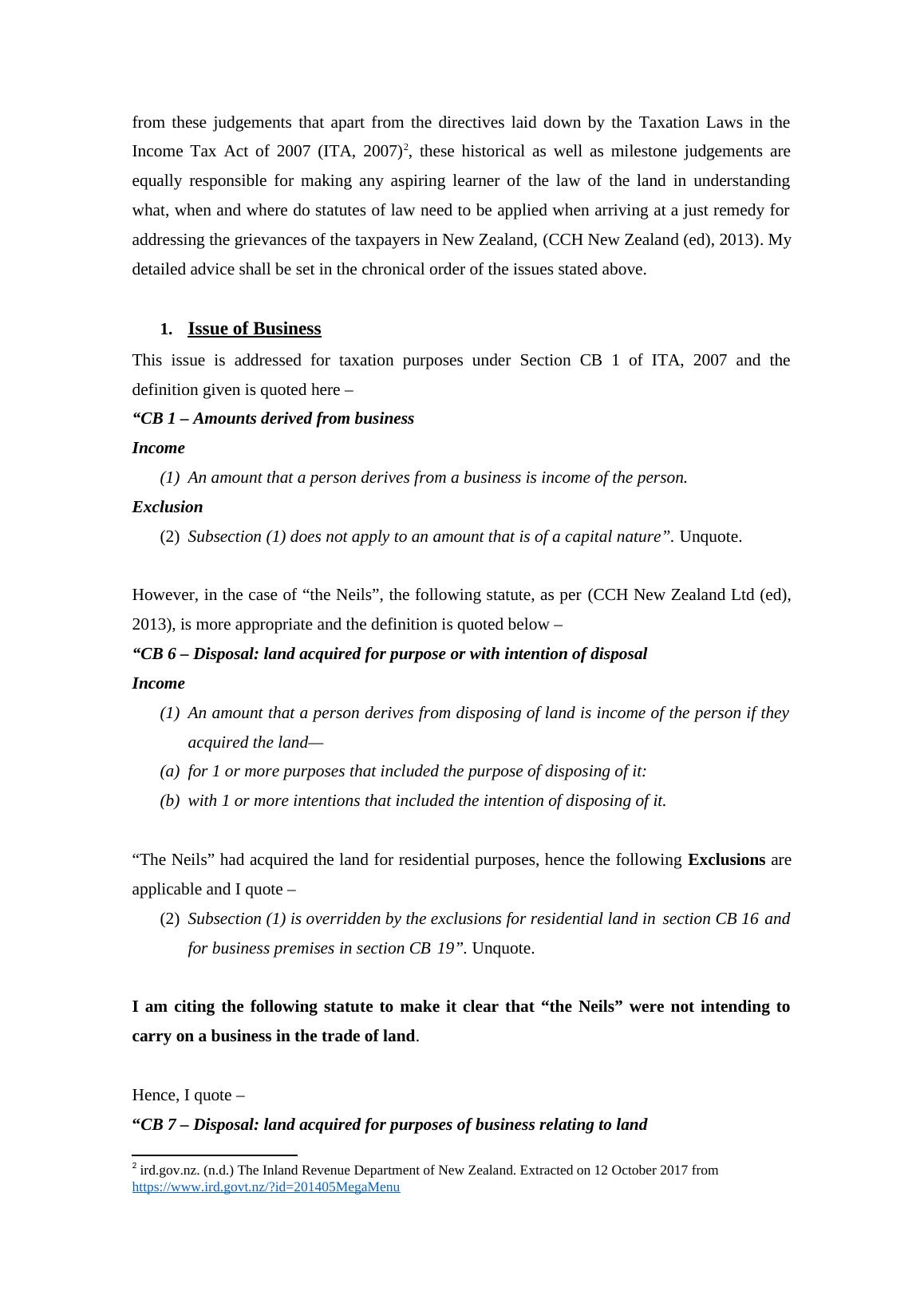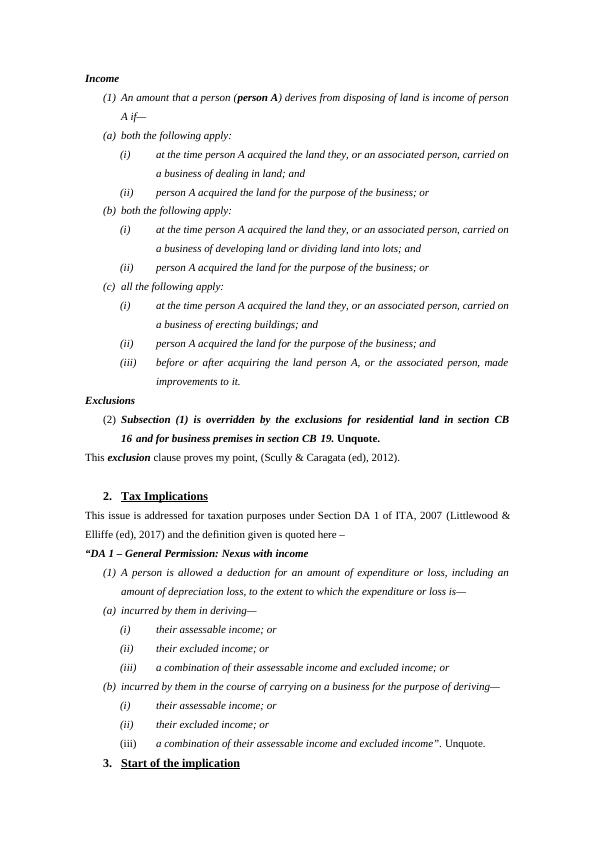Theory of the Income Tax Act of 2007
8 Pages2913 Words197 Views
Added on 2020-05-11
Theory of the Income Tax Act of 2007
Added on 2020-05-11
ShareRelated Documents
TAXATIONISSUE:1.Should Tim Neil and Lacey Neil (referred to as “the Neils” in this report) be consideredto be in business?2.If the sale of the seven lots is considered as a business proposition, what are the taximplications for “the Neils”?3.When should the commencement of their business be considered for taxation purposes?4.Will the profits earned by “the Neils” be considered as “Ordinary Incomes” or “CapitalGains”?THEORY:(A)Section YA1 of the Income Tax Act of 2007(B)Section CB1 of the Income Tax Act of 2007(C)Section CB 4 of the Income Tax Act of 2007(D)Section CB 5 of the Income Tax Act of 2007(E)Section CB 6 of the Income Tax Act of 2007(F)Section CB 7 of the Income Tax Act of 2007(G)Section CB 16 A of the Income Tax Act of 2007(H)Section CB 17 of the Income Tax Act of 2007(I)Section CB 19 of the Income Tax Act of 2007(J)Section DA1 of the Income Tax Act of 20071(K)Anzamco Ltd v Commissioner(L)Aubrey v Commissioner(M)Bates v Commissioner(N)Morrow v Commissioner(O)Vuleta v Commissioner(P)Wellington v CommissionerAPPLICATION:My advice to “the Neils” is broadly based on the derivations which I arrived at from the variousjudgements of the learned judges, both from the High Court as well as the Supreme Court ofNew Zealand in the cases which I have mentioned above in my Theory Section. I have inferred1 ird.gov.nz. (n.d.) The Inland Revenue Department of New Zealand. Extracted on 12 October 2017 from https://www.ird.govt.nz/?id=201405MegaMenu

from these judgements that apart from the directives laid down by the Taxation Laws in theIncome Tax Act of 2007 (ITA, 2007)2, these historical as well as milestone judgements areequally responsible for making any aspiring learner of the law of the land in understandingwhat, when and where do statutes of law need to be applied when arriving at a just remedy foraddressing the grievances of the taxpayers in New Zealand, (CCH New Zealand (ed), 2013). Mydetailed advice shall be set in the chronical order of the issues stated above.1.Issue of BusinessThis issue is addressed for taxation purposes under Section CB 1 of ITA, 2007 and thedefinition given is quoted here –“CB 1 – Amounts derived from businessIncome(1)An amount that a person derives from a business is income of the person.Exclusion(2)Subsection (1) does not apply to an amount that is of a capital nature”. Unquote.However, in the case of “the Neils”, the following statute, as per (CCH New Zealand Ltd (ed),2013), is more appropriate and the definition is quoted below – “CB 6 – Disposal: land acquired for purpose or with intention of disposalIncome(1)An amount that a person derives from disposing of land is income of the person if theyacquired the land—(a)for 1 or more purposes that included the purpose of disposing of it:(b)with 1 or more intentions that included the intention of disposing of it.“The Neils” had acquired the land for residential purposes, hence the following Exclusions areapplicable and I quote – (2)Subsection (1) is overridden by the exclusions for residential land insection CB 16andfor business premises in section CB19”. Unquote.I am citing the following statute to make it clear that “the Neils” were not intending tocarry on a business in the trade of land. Hence, I quote – “CB 7 – Disposal: land acquired for purposes of business relating to land2 ird.gov.nz. (n.d.) The Inland Revenue Department of New Zealand. Extracted on 12 October 2017 from https://www.ird.govt.nz/?id=201405MegaMenu

Income(1)An amount that a person (person A) derives from disposing of land is income of personA if—(a)both the following apply:(i)at the time person A acquired the land they, or an associated person, carried ona business of dealing in land; and(ii)person A acquired the land for the purpose of the business; or(b)both the following apply:(i)at the time person A acquired the land they, or an associated person, carried ona business of developing land or dividing land into lots; and(ii)person A acquired the land for the purpose of the business; or(c)all the following apply:(i)at the time person A acquired the land they, or an associated person, carried ona business of erecting buildings; and(ii)person A acquired the land for the purpose of the business; and(iii)before or after acquiring the land person A, or the associated person, madeimprovements to it.Exclusions(2)Subsection (1) is overridden by the exclusions for residential land insection CB16and for business premises in section CB19. Unquote.This exclusion clause proves my point, (Scully & Caragata (ed), 2012).2.Tax ImplicationsThis issue is addressed for taxation purposes under Section DA 1 of ITA, 2007 (Littlewood &Elliffe (ed), 2017) and the definition given is quoted here –“DA 1 – General Permission: Nexus with income(1)A person is allowed a deduction for an amount of expenditure or loss, including anamount of depreciation loss, to the extent to which the expenditure or loss is—(a)incurred by them in deriving—(i)their assessable income; or(ii)their excluded income; or(iii)a combination of their assessable income and excluded income; or(b)incurred by them in the course of carrying on a business for the purpose of deriving—(i)their assessable income; or(ii)their excluded income; or(iii)a combination of their assessable income and excluded income”. Unquote.3.Start of the implication

End of preview
Want to access all the pages? Upload your documents or become a member.
Related Documents
Taxation Implications of Sale of Land in New Zealandlg...
|21
|5745
|105
Taxation for Accounting Studieslg...
|9
|3244
|81
Deductibility of payment made to extinguish a liability under Australian Taxation Lawlg...
|4
|967
|104
Taxation Law: Hong Konglg...
|3
|1078
|374
Taxation Law of ICI Australia Ltdlg...
|5
|591
|30
New Zealand Taxation Paperlg...
|9
|3017
|151
